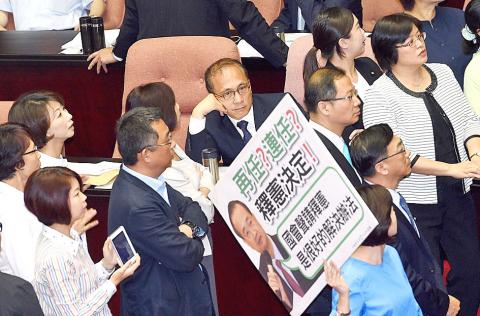Lawmakers yesterday quarreled over a Democratic Progressive Party (DPP) proposal — which it later passed using its legislative majority — to change the legislative agenda so that the review process of the president’s nominations for Judicial Yuan president, vice president and five grand justices could begin.
DPP lawmakers arrived in the chamber early to make sure that Chinese Nationalist Party (KMT) lawmakers could not occupy the speaker’s podium, a scenario the former had been expecting.
The KMT has been insisting that the review of Hsu Tzong-li’s (許宗力) nomination for Judicial Yuan president be suspended because Hsu is a former grand justice — a post he left in 2011 — which the party says disqualifies him from holding the post.

Photo: Peter Lo, Taipei Times
The KMT caucus said whether Hsu can be appointed should be resolved by a constitutional interpretation before the nomination process could proceed.
A cross-caucus negotiation in the morning took about an hour, but failed to reach a consensus.
DPP caucus whip Ker Chien-ming (柯建銘) said the KMT caucus had feigned a willingness to negotiate, but had instead been attempting to delay the process.
“That is it. This frivolous game ends here,” Ker said.
The DPP caucus requested that the legislative agenda be fixed to foil any possibility of the KMT caucus obstructing proceedings by putting forward proposals to change the agenda, before proposing and passing the addition of the review process.
KMT Legislator Lin Wei-chou (林為洲) said that the nomination of Public Functionary Disciplinary Sanction Commission Chief Commissioner Hsieh Wen-ting (謝文定), who had originally been nominated as Judicial Yuan president before the nomination was withdrawn following protests over his role in the KMT authoritarian regime, is “much less controversial” than that of Hsu’s.
“We are not against the grand justice nominees or the [Judicial Yuan] vice president nominee, but Hsu’s nomination is controversial not just for the KMT, but for many with legal backgrounds, who have called it inappropriate,” Lin said.
KMT Legislator Lai Shyh-bao (賴士葆) said the DPP was being “overbearing” in its attempt to push through the nomination process.
Lai said Ker should remember how the KMT caucus had, when it commanded a majority, helped the DPP caucus file a request for a constitutional interpretation over the National Communications Commission’s system of proportional political representation.
DPP Legislator Wu Ping-jui (吳秉叡) said that while the KMT cites “people’s opinions,” many academics have argued against Hsu’s appointment being unconstitutional.
“That is why we need to begin the review, so that whether the nominees qualify can be examined publicly. The KMT should stop supposing that its argument is correct. The obstruction the KMT is undertaking is tantrum-throwing because it does not know how to convince the public to support it,” Wu said.
The legislature passed the DPP’s proposal to start the review process on Thursday next week and vote on the nominees on Oct. 25.

DEFENSE: The National Security Bureau promised to expand communication and intelligence cooperation with global partners and enhance its strategic analytical skills China has not only increased military exercises and “gray zone” tactics against Taiwan this year, but also continues to recruit military personnel for espionage, the National Security Bureau (NSB) said yesterday in a report to the Legislative Yuan. The bureau submitted the report ahead of NSB Director-General Tsai Ming-yen’s (蔡明彥) appearance before the Foreign and National Defense Committee today. Last year, the Chinese People’s Liberation Army (PLA) conducted “Joint Sword-2024A and B” military exercises targeting Taiwan and carried out 40 combat readiness patrols, the bureau said. In addition, Chinese military aircraft entered Taiwan’s airspace 3,070 times last year, up about

Taiwan is stepping up plans to create self-sufficient supply chains for combat drones and increase foreign orders from the US to counter China’s numerical superiority, a defense official said on Saturday. Commenting on condition of anonymity, the official said the nation’s armed forces are in agreement with US Admiral Samuel Paparo’s assessment that Taiwan’s military must be prepared to turn the nation’s waters into a “hellscape” for the Chinese People’s Liberation Army (PLA). Paparo, the commander of the US Indo-Pacific Command, reiterated the concept during a Congressional hearing in Washington on Wednesday. He first coined the term in a security conference last

A magnitude 4.3 earthquake struck eastern Taiwan's Hualien County at 8:31am today, according to the Central Weather Administration (CWA). The epicenter of the temblor was located in Hualien County, about 70.3 kilometers south southwest of Hualien County Hall, at a depth of 23.2km, according to the administration. There were no immediate reports of damage resulting from the quake. The earthquake's intensity, which gauges the actual effect of a temblor, was highest in Taitung County, where it measured 3 on Taiwan's 7-tier intensity scale. The quake also measured an intensity of 2 in Hualien and Nantou counties, the CWA said.

The Overseas Community Affairs Council (OCAC) yesterday announced a fundraising campaign to support survivors of the magnitude 7.7 earthquake that struck Myanmar on March 28, with two prayer events scheduled in Taipei and Taichung later this week. “While initial rescue operations have concluded [in Myanmar], many survivors are now facing increasingly difficult living conditions,” OCAC Minister Hsu Chia-ching (徐佳青) told a news conference in Taipei. The fundraising campaign, which runs through May 31, is focused on supporting the reconstruction of damaged overseas compatriot schools, assisting students from Myanmar in Taiwan, and providing essential items, such as drinking water, food and medical supplies,